Becoming a parent is an incredible journey, and one of the most crucial tasks is creating a healthy sleep routine for your 11-month-old. Your baby’s sleep needs are evolving at this exciting stage, making it a perfect time to find that ideal schedule. This guide will give you insights into a typical sleep pattern for your little one, tips for personalising it to fit their unique requirements, and the vital role sleep plays in their overall growth and development. Let’s dive in together!
Table of Contents
Why an 11-Month-Old Sleep Schedule is Important
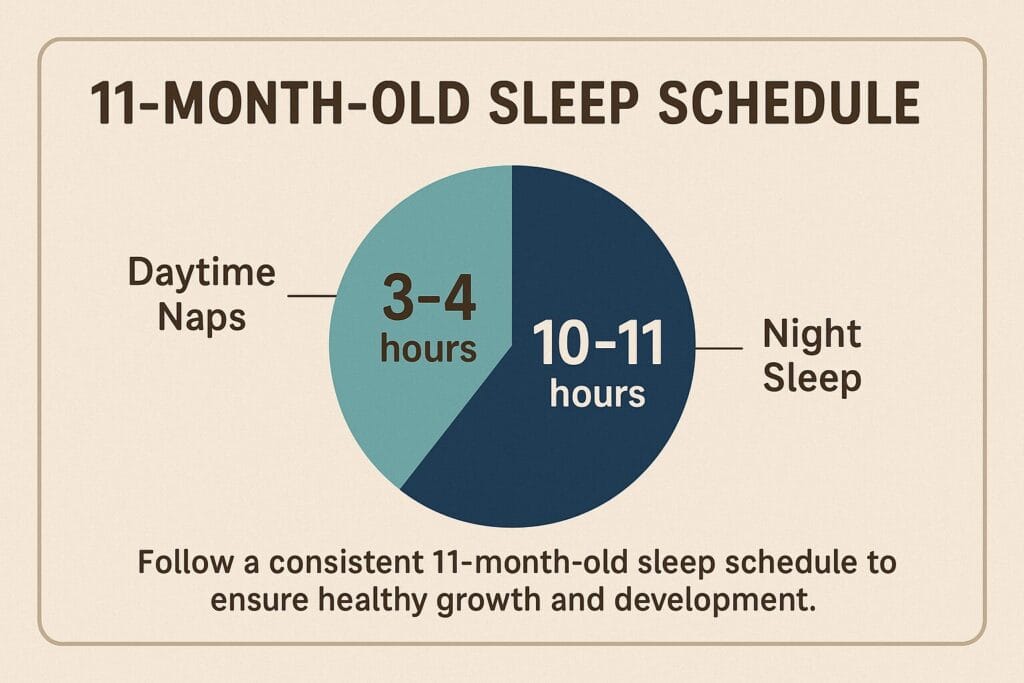
A consistent sleep schedule for your 11-month-old is essential for their development. As their circadian rhythm matures, a structured routine helps signal when it’s time to sleep and play, enhancing sleep quality. With a well-established pattern, your baby will fall asleep easily, stay asleep longer, and wake up refreshed, all of which support their cognitive and physical growth.
Having a structured 11-month-old sleep schedule also benefits parents. It helps you plan your day more effectively and ensures that your baby gets the appropriate amount of rest. A clear 11-month-old sleep schedule reduces the risk of overtiredness, which can lead to fussy behavior and difficulty falling asleep. This consistency in sleep is crucial for both your baby’s mood and health.
“To help your baby breathe easier and sleep better, check out our expert advice on the Best Sleeping Position for Baby with Stuffy Nose.”
Key Components of an 11-Month-Old Sleep Schedule
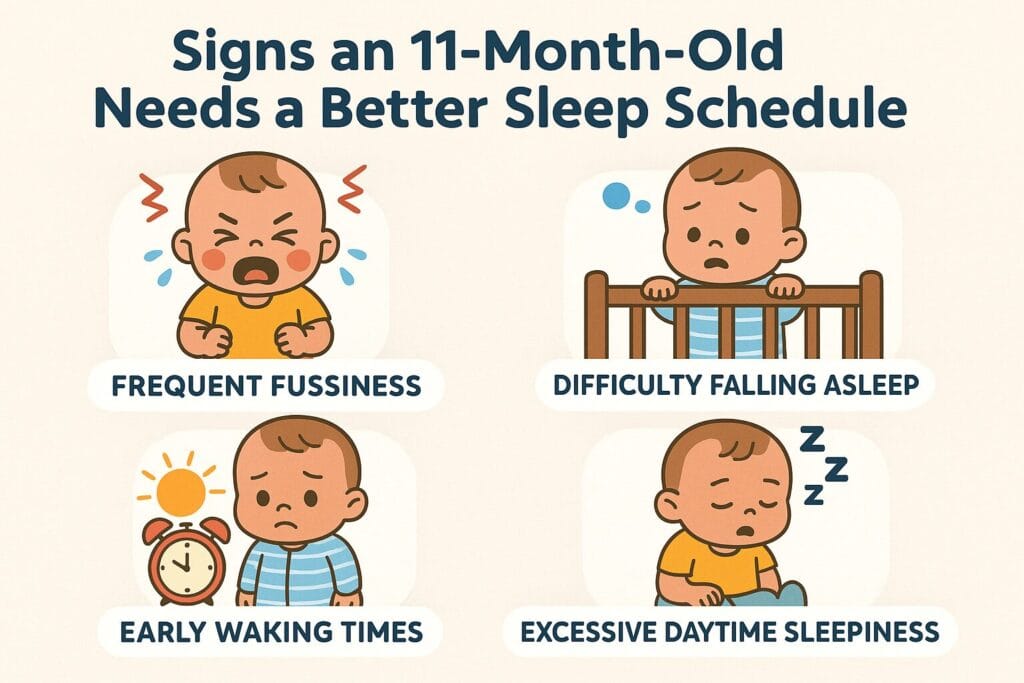
Before diving into a sample sleep schedule for 11-month-old babies, it’s important to understand the fundamental elements that make up your baby’s sleep routine. An ideal 11-month-old sleep schedule consists of two main components: nighttime sleep and naps. At this stage, your baby may still be transitioning between nap schedules, but understanding these key elements will help you create a balanced and effective 11-month-old sleep schedule.
1. Night time Sleep
By 11 months, your baby’s ability to sleep through the night is becoming more consistent. A typical 11-month-old sleep schedule includes 10-12 hours of sleep at night. Nighttime sleep is often the longest stretch of rest for babies at this age, which is why it’s essential to establish a bedtime routine that signals to your baby that it’s time for sleep. Whether it’s reading a story, using white noise, or dimming the lights, these bedtime cues help your baby understand that it’s time to wind down for the night.
A consistent 11-month-old sleep schedule helps your baby fall asleep at a set time each evening and promotes a more restful night of sleep. Establishing a calming nighttime routine will reinforce the 11-month-old sleep schedule, making it easier for your baby to sleep soundly throughout the night.
2. Naps
At 11 months, your baby is likely transitioning from two naps a day to one longer nap. The 11-month-old sleep schedule will include a single nap in the afternoon that typically lasts between 1.5 and 2 hours. The timing of this nap is crucial; ideally, it should be scheduled between 12:00 PM and 2:00 PM to ensure it doesn’t interfere with bedtime.
If your baby is still adjusting to the 11-month-old sleep schedule 1 nap, keep an eye on their cues. Some babies may still need a short morning nap, but they will eventually outgrow this need. A balanced 11-month-old sleep schedule will help your baby transition to this new nap schedule smoothly while maintaining adequate rest throughout the day.
Crafting the Ideal 11-Month-Old Sleep Schedule
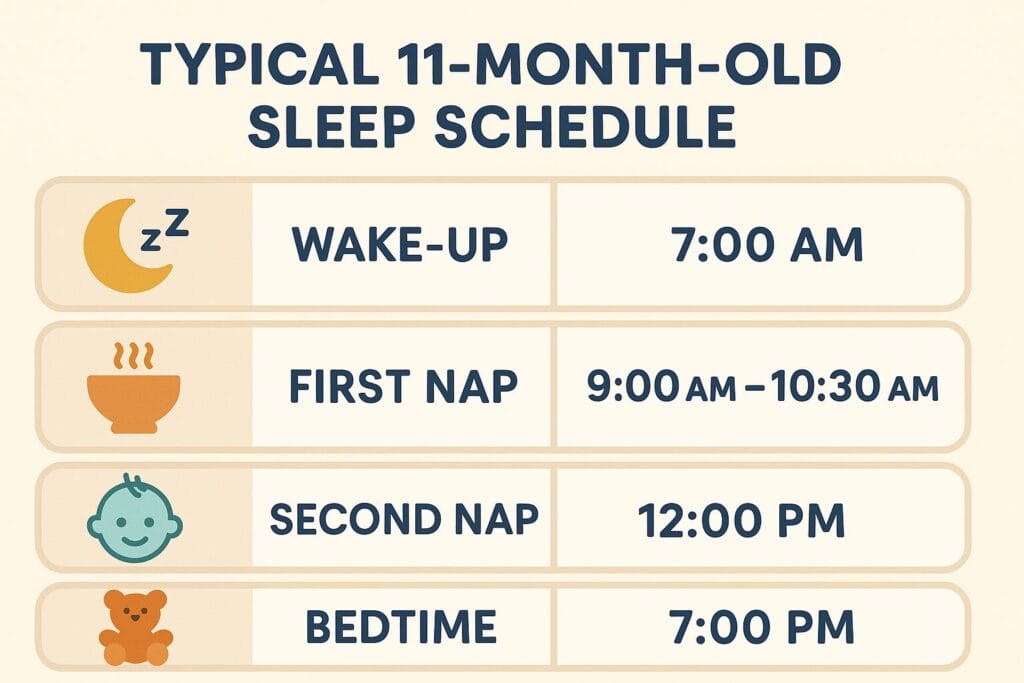
Creating a well-balanced 11-month-old sleep schedule that fits your baby’s needs can make all the difference in their mood and well-being. Here’s a sample 11-month-old sleep schedule that includes sleep, feeding, and playtime:
Sample Sleep Schedule for an 11-Month-Old:
- 7:00 a.m.: Wake up and start the day. A consistent wake-up time is key to maintaining a balanced 11-month-old sleep schedule.
- 8:00 AM: Breakfast. Providing a nutritious breakfast will help fuel your baby for the day and maintain energy levels until their first nap.
- 9:00 AM – 10:30 AM: Nap 1. If your baby is still transitioning to one nap, they may need a short morning nap.
- 11:00 AM: Snack. Offering a light snack will help keep your baby’s energy up as they prepare for nap time.
- 12:00 PM – 2:00 PM: Nap 2. This is the main nap of the day, typically lasting 1.5 to 2 hours, depending on your baby’s needs.
- 2:30 PM: Lunch. After waking up, offer a balanced meal to keep your baby satisfied.
- 3:00 PM – 5:00 PM: Playtime or activities. This is the perfect time for your baby to engage in physical play, which helps burn off energy before bedtime.
- 5:00 PM: Dinner. A lighter meal to help your baby wind down for the evening.
- 6:00 PM: Bath time and bedtime routine. Prepare your baby for sleep with calming activities that are part of their established 11-month-old sleep schedule.
- 7:00 PM: Bedtime. Ensure your baby goes to bed at a consistent time to support a healthy 11-month-old sleep schedule.
This sample sleep schedule for 11-month-old babies can be adjusted based on your baby’s preferences and needs. For example, if your baby tends to wake up earlier, you can adjust the schedule to start the day earlier, keeping the 11-month-old sleep schedule consistent.
For expert advice on managing your baby’s sleep and wake cycles for better development, explore our detailed guide on 3-Month-Old Wake Windows: Tips for Better Sleep and Development
Understanding Variations in an 11-Month-Old Sleep Schedule
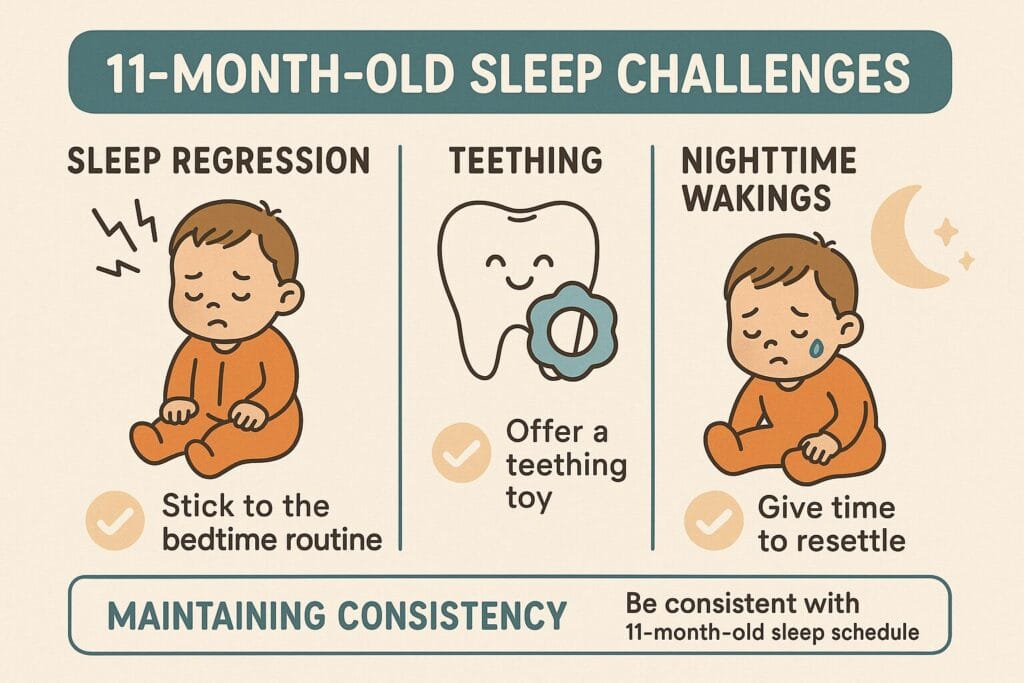
Each baby is unique, and their 11-month-old sleep schedule will vary depending on their temperament and needs. While most babies transition from two naps to one, others may need to stay on a two-nap schedule a little longer. Here’s how to adapt your 11-month-old sleep schedule:
1. Sleep Schedule for an 11-Month-Old with One Nap
Most babies at 11 months are ready to drop their morning nap and switch to one afternoon nap. This 11-month-old sleep schedule typically allows for a nap that lasts 2 to 3 hours, depending on your baby’s needs. Adjusting to a 11-month-old sleep schedule 1 nap may require a gradual transition, and you might find that your baby’s bedtime shifts slightly later as they adjust.
The key to maintaining a smooth 11-month-old sleep schedule with one nap is to monitor your baby’s wake windows. At 11 months, babies can typically stay awake for 4-5 hours before needing a nap. This flexibility in their 11-month-old sleep schedule helps prevent overtiredness, which can interfere with their ability to settle down for bedtime.
2. Common Sleep Challenges for 11-Month-Olds
While an 11-month-old sleep schedule can be very effective, it’s not uncommon for parents to encounter sleep disruptions due to teething or sleep regressions. At 11 months, babies may experience discomfort from teething, causing them to wake more frequently during the night. These challenges can make it difficult to maintain the 11-month-old sleep schedule.
If your baby is going through a sleep regression or teething discomfort, try to maintain consistency in their 11-month-old sleep schedule. Offering comfort when they wake, such as gently soothing them back to sleep, will help them settle down without completely disrupting their sleep pattern. Over time, their sleep will return to normal, and the 11-month-old sleep schedule will become a steady part of their routine.
The Importance of Consistency in Sleep Schedules
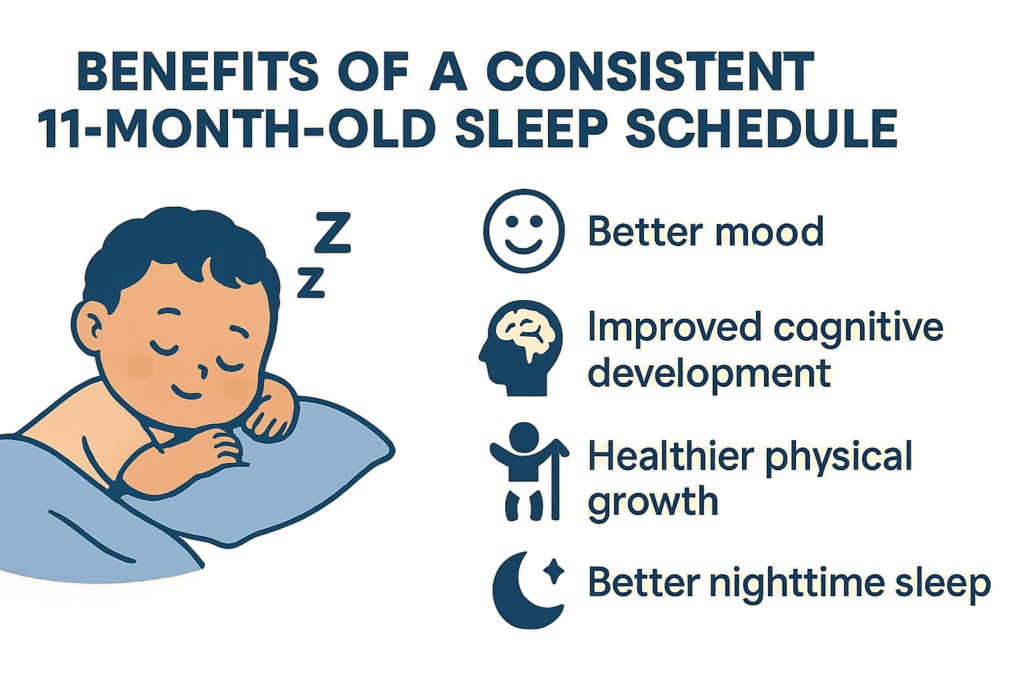
Consistency is one of the most important factors in maintaining a healthy 11-month-old sleep schedule. Babies thrive on routine, and having a predictable schedule will help them learn when it’s time to sleep and when it’s time to wake up. This consistency makes it easier for your baby to fall asleep independently and stay asleep longer throughout the night.
Consistency in Wake-Up Time
Having a set wake-up time every morning helps maintain a balanced 11-month-old sleep schedule. This consistency sets the tone for the rest of the day and ensures that your baby gets the appropriate amount of sleep. If your baby’s wake-up time varies, it can interfere with their 11-month-old sleep schedule, making it harder to get them back on track.
Bedtime Routine
A consistent bedtime routine reinforces the 11-month-old sleep schedule. Activities like reading a story, dimming the lights, or playing soft music signal to your baby that it’s time to wind down. This helps them transition from playtime to sleep time more easily and ensures that they are ready for rest when it’s time to go to bed.
Sample Feeding and Sleeping Schedule for 11-Month-Old
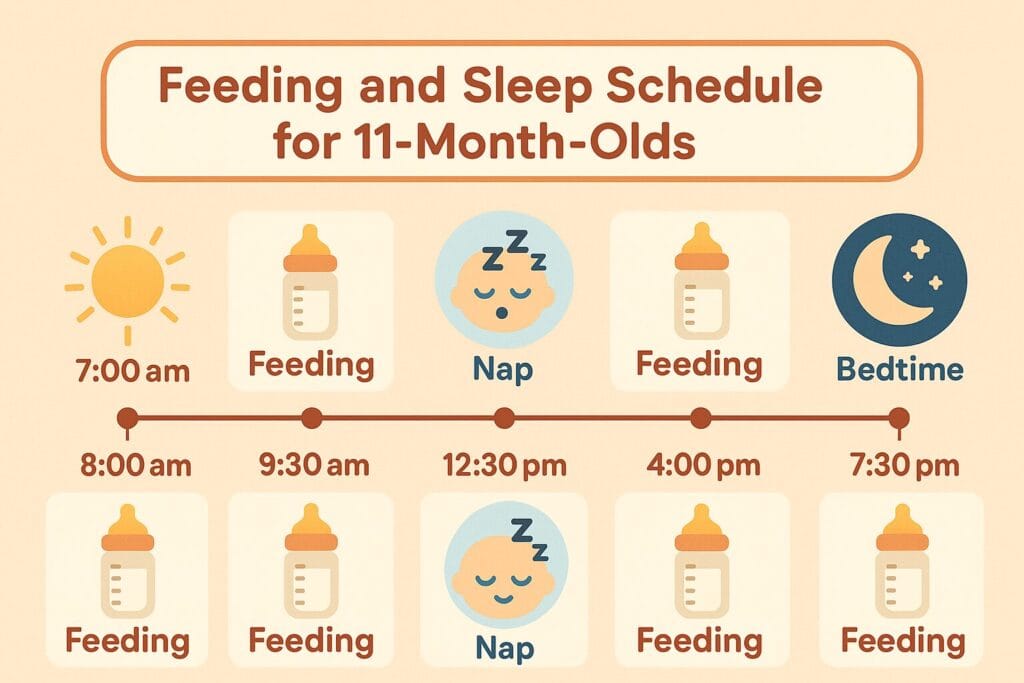
At 11 months, your baby is likely eating more solids, and their feeding and sleep schedule for 11-month-old babies should be synchronized. Proper nutrition, paired with an appropriate 11-month-old sleep schedule, ensures your baby gets the necessary energy for growth while also providing enough sleep.
A balanced feeding and sleep schedule for 11-month-old babies includes:
- 7:00 AM: Wake up and breastfeed or bottle-feed.
- 8:00 AM: Breakfast (solid foods like oatmeal, fruit, and eggs).
- 12:00 PM: Lunch (balanced meals like vegetables, proteins, and grains).
- 2:00 PM – 3:30 PM: Nap.
- 5:00 PM: Dinner (family meal or something similar but lighter).
- 6:30 PM: Nighttime feed (breastfeed or bottle-feed).
The Best Sleep Schedule for 11-Month-Olds
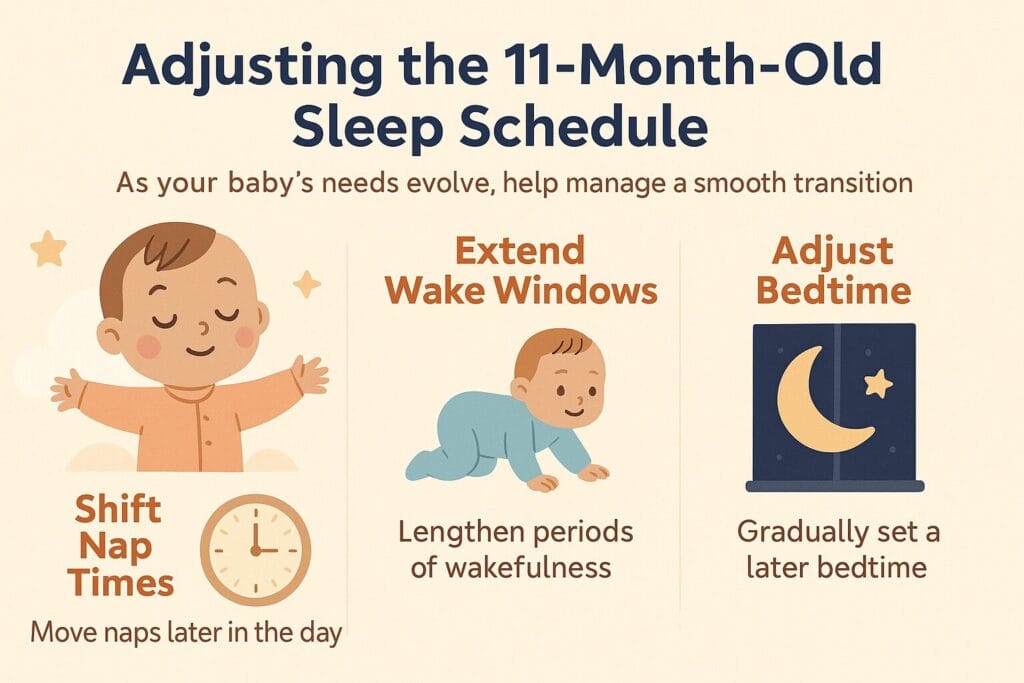
The ideal 11-month-old sleep schedule will vary from baby to baby. However, most babies at this age benefit from one nap during the day and a consistent nighttime routine. The key is to observe your baby’s unique needs and adjust the 11-month-old sleep schedule as necessary while maintaining consistency. Over time, you’ll find a rhythm that works for both your baby and your family.
FAQs About 11-Month-Old Sleep Schedule
1. How much sleep does an 11-month-old need?
At 11 months, babies typically need around 12-14 hours of sleep in a 24-hour period. This includes 10-12 hours of nighttime sleep and 1.5-2 hours of nap time during the day. Each baby’s needs may vary, so it’s important to observe your baby’s behavior and adjust their 11-month-old sleep schedule accordingly.
2. What is a typical 11-month-old sleep schedule for a baby who’s transitioning from two naps to one?
Many 11-month-olds will drop their morning nap and transition to one longer afternoon nap. A typical 11-month-old sleep schedule for babies making this transition will include one nap that lasts between 2 and 3 hours, usually in the early afternoon, with 10-12 hours of sleep at night.
3. How can I help my 11-month-old adjust to a single nap schedule?
To help your baby transition to a single nap, ensure they have a consistent wake-up time in the morning and gradually increase their wake windows between sleep periods. This will help your baby stay awake longer before taking their afternoon nap. By following a predictable 11-month-old sleep schedule, your baby will learn to adjust to the longer nap over time.
4. How do I know if my 11-month-old is getting enough sleep?
Signs that your baby is getting enough sleep include consistent mood, happy behavior during the day, and falling asleep easily at night. If your baby is consistently waking up at a reasonable time and is not showing signs of excessive sleepiness during the day, they are likely following a healthy 11-month-old sleep schedule.
5. My 11-month-old is waking up multiple times at night. How can I help?
Night wakings at 11 months can be due to various factors, including teething, separation anxiety, or changes in their 11-month-old sleep schedule. To address this, ensure that your baby’s bedtime routine is consistent and calming. You can also consider offering comfort without picking them up, which will help reinforce their independence in sleeping. If the issue persists, it’s best to consult your pediatrician.
6. Can I still feed my 11-month-old during the night?
By 11 months, many babies no longer need nighttime feedings, as they are getting most of their nutrition during the day. However, some babies may still require a quick feed if they are experiencing growth spurts or teething discomfort. If your baby is still waking for feeds, try to gradually reduce the frequency of night feedings and establish a steady 11-month-old sleep schedule.
7. How do I handle sleep regression at 11 months?
Sleep regression is common around 11 months and can result in your baby waking more frequently during the night. It is often related to developmental changes or teething. To address sleep regression, maintain consistency in your baby’s 11-month-old sleep schedule, ensure they are getting enough daytime sleep, and provide comfort when needed to help them settle back to sleep.
8. Should I adjust my baby’s 11-month-old sleep schedule if they are starting daycare?
Yes, if your baby is starting daycare, you may need to adjust their 11-month-old sleep schedule to accommodate the daycare’s routine. This might include adjusting nap times and bedtime to ensure your baby gets the rest they need while adjusting to a new environment. Consistency is key, so try to keep the routine as close to their home schedule as possible.
9. Can I use sleep training methods to improve my 11-month-old’s sleep schedule?
At 11 months, many babies can benefit from sleep training methods, which can help them fall asleep independently and stay asleep longer. Gradual methods such as the Ferber method or gentle sleep training techniques can be useful. Make sure your baby’s 11-month-old sleep schedule is consistent, and remember that sleep training requires patience and consistency.
10. What if my baby is consistently overtired despite following the 11-month-old sleep schedule?
If your baby seems overtired despite following a consistent 11-month-old sleep schedule, it could be due to short or poorly timed naps, overstimulation, or inconsistent sleep habits. Try to observe their natural sleep cues, adjust their nap times, and ensure their sleep environment is conducive to restful sleep. If the problem continues, consult with your pediatrician.
Conclusion: Perfecting Your 11-Month-Old Sleep Schedule
Establishing a consistent 11-month-old sleep schedule is one of the best ways to ensure that your baby gets the right amount of rest they need to thrive. At this stage, your baby is transitioning into more predictable sleep patterns, and having a well-structured sleep routine can help promote better sleep quality, happier moods, and overall healthy development.
Whether your baby is still on a two-nap schedule or has transitioned to one, maintaining consistency in their 11-month-old sleep schedule is key. By following the tips and strategies outlined in this guide—such as having a consistent bedtime routine, adjusting nap times, and observing your baby’s sleep cues—you can create a routine that supports your baby’s sleep needs.
Remember, every baby is different. What works for one may need slight adjustments for another. Be patient with the process, and trust that with time and consistency, your baby will develop healthy sleep habits that will last into toddlerhood.
By perfecting your 11-month-old sleep schedule, you’ll not only help your baby get the rest they need, but you’ll also improve your own sleep and create a balanced, peaceful daily routine.



